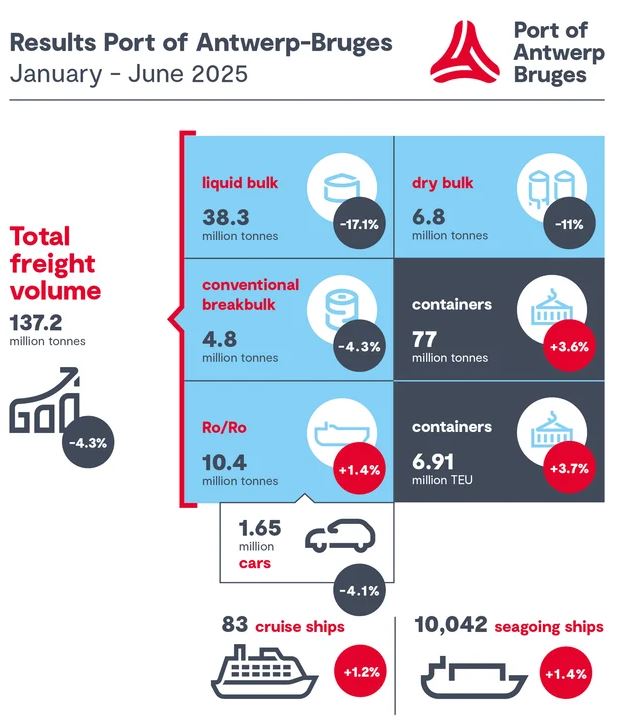 In the first half of 2025, Port of AntwerpŌĆæBruges handled a total ofŌĆ»137.2ŌĆ»million tonnes of cargo, representing a 4.3ŌĆ»% decrease compared with the same period in 2024, according to the company's release.
In the first half of 2025, Port of AntwerpŌĆæBruges handled a total ofŌĆ»137.2ŌĆ»million tonnes of cargo, representing a 4.3ŌĆ»% decrease compared with the same period in 2024, according to the company's release.
Declines in dry and liquid bulk volumes were only partly offset by growth in container and RoRo traffic.
Container throughput rose 3.6ŌĆ»% to 77ŌĆ»million tonnes and 3.7ŌĆ»% to 6.91ŌĆ»millionŌĆ»TEUs, while RoRo volumes edged up 1.4ŌĆ»%.
Persistent terminal congestion, driven by Covid-related disruptions, Red Sea rerouting, alliance reshuffles, poor schedule reliability, increased dwell times (7–8 days vs. 5 days), and union actions, continues to burden landside operations across Northwest Europe.
To alleviate capacity constraints, the Extra Container Capacity Antwerp (ECA) project is planned to provide a new dock and optimise handling space.
Liquid bulk throughput declined 17.1ŌĆ»%, due to lower volumes in fuels, naphtha and LNG, mitigated only by LPG and kerosene offsets.
Chemical volumes including biofuels grew 8.9ŌĆ»%, though core chemicals remained flat.
Dry bulk dropped 11ŌĆ»%, with coal and construction materials down but fertilizer imports up, reflecting EU bans and tariffs on Russian commodities.
Conventional general cargo declined 4.3ŌĆ»%, driven by steel and iron, while unaccompanied freight slipped 1ŌĆ»%.
Transatlantic trade strengthened: U.S. volumes rose 17.2ŌĆ»% to 16.4ŌĆ»million tonnes.
Imports from the U.S. grew 13.1ŌĆ»% to 9.7ŌĆ»million tonnes, and exports rose 23.5ŌĆ»% to 6.7ŌĆ»million tonnes, though vehicle exports have fallen since May due to U.S. tariffs.
Container exports remained stable at 303,000ŌĆ»TEUs; imports rose 12.6ŌĆ»%.
The second half outlook depends on a possible EUŌĆæU.S. trade agreement by AugustŌĆ»1.
“In a challenging economic climate… our resilience as a port,” said CEO Jacques Vandermeiren, noting mixed bulk trends, container growth, and congestion strains, and highlighting the ECA project to support future growth.
Port of AntwerpŌĆæBruges, formed by the 2022 merger of the ports of Antwerp and Zeebrugge, is a publicŌĆÉlaw port authority jointly owned by the cities of Antwerp and Bruges. It handles around 280ŌĆ»million tonnes of cargo annually and is committed to climate neutrality by 2050.



